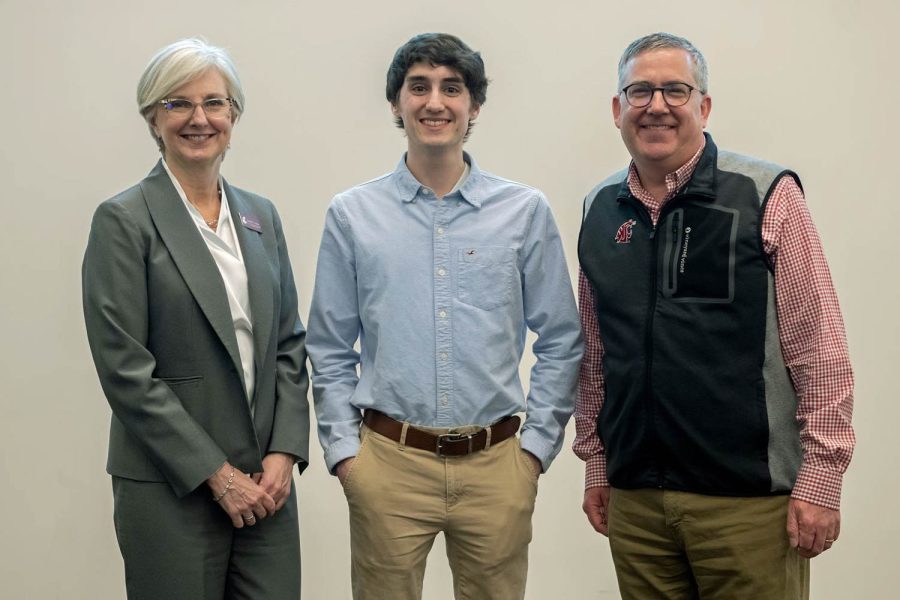College of Veterinary Medicine student named 2023 winner of Three Minute Thesis contest
Morledge’s presentation required audience members to engage in an activity to match DNA sequences to their most similar counterparts
COURTESY OF WSU COLLEGE OF VETERINARY MEDICINE
Morledge (middle) with Executive Vice President and Provost Elizabeth Chilton (left) and WSU President Kirk Schulz (right).
April 12, 2023
WSU’s annual Three Minute Thesis competition took place in The Spark: Academic Innovation Hub on March 29. Benjamin Stuart Morledge-Hampton was named the first-place winner for his presentation titled “Are you smarter than a computer?” and required audience members to engage in an activity to match DNA sequences to their most similar counterparts. This is a task that can be completed by computer programs, but is often less challenging for humans to do, Morledge said.
His research would allow for other computational biologists such as himself to detect and treat diseases that may arise as a result of DNA mutations, such as cancer. “The whole idea is, we just want more information on where these [DNA] repairs are happening,” he said. “It’s really important to understand where these repairs are happening and what mutations are actually important in cancer.”
The Three Minute Thesis competition was first established at WSU in 2014 as an expansion of the competition which originated in Australia and New Zealand, according to the Three Minute Thesis website.
The goal of the Three Minute Thesis competition is to allow students to improve their oral communication skills and learn how to explain their research and ideas to a general audience that has no knowledge of their field. Graduate students from all disciplines participate in this competition every year, and take turns presenting their research to a panel of judges from a diverse body of backgrounds in under three minutes.
Morledge said that he hopes his research can assist with developing targeted cancer therapy treatments in the future which would aim to kill cancer cells specifically.
“Treatments like chemotherapy are effective at killing cancer cells, but they also kill a lot of your normal cells too, which is why they’re so hard on people,” he said.
Morledge is a computational biologist and current fourth-year doctoral student in the School of Molecular Biosciences. He was representing the College of Veterinary Medicine and competed against eight other graduate students for the prize. Morledge is also a teacher’s assistant at WSU and brought the College of Veterinary Medicine’s first Three Minute Thesis win since 2018, according to WSU’s official Three Minute Thesis website.
Morledge won a $3,000 travel grant, which will go towards a research conference of his choice. He said he hopes to continue his research after earning his PhD and would one day like to share his passion for science with others by pursuing teaching at the undergraduate level.
The competing students hailed from various disciplines, including the Carson College of Business, the College of Arts and Sciences, and the College of Education, Morledge said. Morledge has been completing his thesis on protein-bonding, more specifically DNA damage and its causes, as well as how to locate mutations in DNA sequencing in the human body.
Morledge said that the goal with of his research is to be able to pinpoint the locations in the human genome where mutations are occurring and learn which kinds of mutations can cause cancer so that they may be treated individually.
Sara Zaske, a science writer for WSU News & Media Relations as well as a judge on the Three Minute Thesis panel, said that she thinks that simple science communication is crucial and that scientific research should be communicated in a way that is accessible to the general public.
Zaske said that Morledge was effectively able to make his presentation both engaging and informative to the audience without it being overwhelming.
“I think what he did really well was that he engaged the audience right away,” Zaske said. “He asked them a question, asked them to do something, and you could just see everybody come alive.”
Morledge said that he believes it is a crucial aspect of research to be able to translate one’s discoveries in a way that is easy for others to understand.
“If there’s anyone that is considering doing Three Minute Thesis, or something to that effect, I’d say do it because it’s a really good experience,” Morledge said.





















